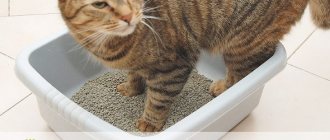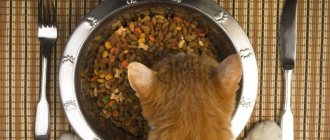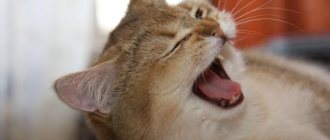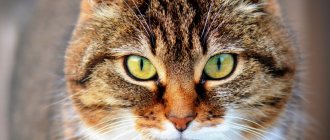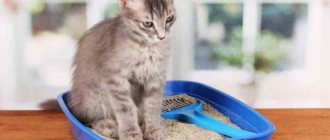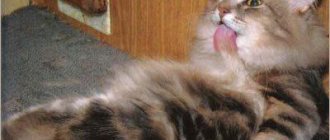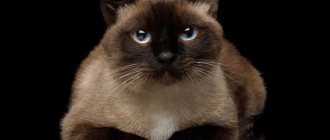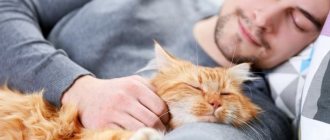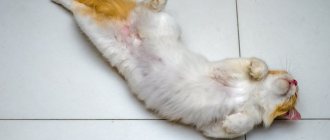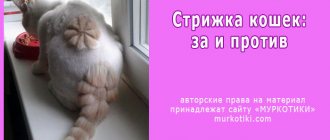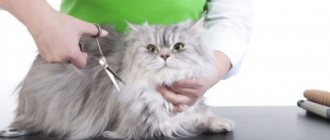Castration is a serious surgical intervention in the vital functions of an animal’s body. This is not just ridding the cat of sexual desire by removing the testicles. Such interventions have an impact on subsequent behavior, habits and functioning of the body. The owner needs to understand how to feed a castrated cat correctly, how to care for him, and what his needs are.
Changes in the body after castration
Domestic cats are castrated without asking their opinion, primarily to solve practical problems. An overly active and sometimes aggressive animal becomes calmer, sometimes even inert. In addition, the alpha male stops marking his territory, losing interest in the opposite sex. This helps get rid of the persistent “cat” odor, which in a sexually active cat is very unpleasant to human perception.
The testicles and gonads in cats perform the same functions as in other mammals, including humans. They produce sex hormones necessary for the stable functioning of the reproductive system. Their removal entails a serious hormonal imbalance. While the main restructuring is underway, the cat can remain active and continues to leave “marks.”
However, after some time, the owners notice that the animal has calmed down and no longer carries out night chases.
The cat, having lost its masculine strength, instinctively seeks a replacement. And most often it is found in food. And the owners, especially if they are worried, feel guilty for depriving the animal of “masculinity”, begin to intensively pamper the pet with various goodies. Coupled with the decrease in physical activity that occurs after castration, this regime leads to obesity. Therefore, owners need to pay increased attention to the cat’s nutrition after such an operation, because excess weight is the cause of the development of many diseases.
In addition to obesity, cats are also at risk for other health problems. The most likely danger of neutered cats is the development of urolithiasis. The fact is that after the operation, not only the hormonal balance is rearranged, changes also occur at the physical level.
The genitourinary system begins to function somewhat differently: in particular, a slight narrowing of the urethra occurs. Such changes especially affect kittens whose testicles were removed at an early age, before six months, when the organs of the genitourinary system have not yet fully developed.
In general, according to veterinarians, it is most optimal and correct to carry out castration at the age of eight months to a year. To avoid psychological trauma, the animal should not have sexual contact before surgery.
Having once experienced the joys of sexual life, having realized the instinct of procreation, the cat will no longer forget the experience gained and will suffer greatly. Of course, there are different situations, sometimes it is necessary to castrate adult cats. However, those who have a tailed pet need to immediately resolve the issue of castration and do everything in a timely manner, this will significantly reduce the likelihood of problems in the future.
The development of urolithiasis is always associated with poor nutrition. If there is a lot of phosphorus, magnesium and calcium in food, this contributes to the formation of sand and stones in the kidneys and other organs of the genitourinary system, since these elements are not completely eliminated, but settle in the form of salts.
Owners who have sterilized their cat need to pay great attention to their pet’s diet, as well as the size of portions and frequency of feeding, in order to prevent the development of possible diseases.
Feeding after surgery
Your doctor will tell you how to feed your cat immediately after surgery. Usually, after anesthesia, it is recommended not to give the animal food immediately (and he most likely will not want to). There should be enough water, because after anesthetic medications the cat may feel thirsty.
When the animal completely recovers from anesthesia and asks for food, you can give it a little kefir, a weak meat broth.
You should not give solid food right away. It is also impossible to infuse it by force: the animal itself knows what it needs.
On the second day, you can give food to which the cat is already accustomed. Sudden changes in diet will harm both psychologically and physically. The cat should be transitioned to a new diet gradually. If a pet lives in a house from an early age, and the decision to castrate is made in advance, it is better to initially accustom it to certain foods. Then after surgery you will not need to make changes to your diet.
For several days after surgery, it is necessary to exclude fatty foods from the diet (for example, do not give sour cream, fatty fish or meat). The protein component should be strengthened. Fatty foods are generally harmful, but sometimes you can pamper your pet, but not often. Protein is simply necessary for a predator.
The cat should be gradually transferred to a new diet so that he does not experience psychological stress and problems with the gastrointestinal tract. After surgery, veterinarians recommend supporting the animal’s body by conducting a vitamin and mineral course.
The drug Gamavit helps to recover well. This complex product containing vitamins, amino acids and healthy salts is made on the basis of a growth nutrient medium.
Nutritional features of a castrated cat
Cats get used to a certain lifestyle, including feeding schedules. Any disruption to the usual course of events can cause them stress. Therefore, from an early age, if possible, it is necessary to accustom your pet to a certain style of feeding.
The following rules should be followed:
- You cannot feed natural food and prepared food at the same time. If a cat is accustomed to a natural diet, he can, of course, occasionally be pampered with ready-made food, but constantly giving two types of food is strictly prohibited. This is due to the fact that industrial feed contains the entire necessary set of nutrients, taking into account the age and individual characteristics of the animal. They are developed in such a way that the cat’s body receives everything it needs. If such food is mixed with natural products, there is a high risk that some nutrients will be deficient and others will be in excess.
- Cat food should be warm (but not hot).
- It is recommended to feed the cat 3-4 times a day. There must be a certain schedule that the animal will get used to. Although cats do not know how to use a watch, they clearly know the usual feeding time.
- The place where the cat eats must be permanent. It is advisable to choose a quiet corner where the animal will feel safe and no one will distract it from eating. If there are several pets in the house, then you need to make sure that they do not interfere with each other, and each of them can safely eat their food.
- If the cat has a natural diet, then after eating it is necessary to clear it “from the table”. Protein food gets exposed to air, loses its properties, and simply spoils. The diet should consist of 80% protein, since the cat’s gastrointestinal tract is adapted to digesting soft meat fibers and does not tolerate coarse plant fibers well.
- If a neutered cat is fed ready-made food, you should stick to one brand of food. The main diet should be dry food, wet food should be given less often, about once a day.
Cat food manufacturers that have proven themselves on the market usually produce special lines of food designed specifically for neutered cats. They have a reduced content of phosphorus, calcium and magnesium. You can also choose food designed for young or old animals with short or long hair.
Proper selection of food will help provide your pet’s body with all the necessary substances without causing harm to it.
Store-bought food
When preparing individual meals for your pet at home is too labor-intensive, it is better to use ready-made food, which was developed together with leading veterinarians, is balanced, and contains all the important nutrients. A proper diet will ensure your pet is in good health, smooth, shiny coat, and healthy teeth.
There are five classes of cat food:
- Economy class. Such food suppresses the feeling of hunger, having low nutritional value, less than half is absorbed. They contain many dyes, flavors, and preservatives. The basis of the composition is processed plant fibers, meat is replaced by offal. Can I feed this? There is no money for quality food - choose natural food for your pet;
- The middle class of feed contains less soy and by-products, and more meat. Due to its high nutritional value, your pet eats a smaller portion. The composition indicates the specific type of meat and vegetables used in production. The packaging bears the AAFCO (American Association Approved) mark. The share of meat products is more than 25%. Does not contain chemical dyes or bone meal;
- premium class is created on the basis of meat, which makes up half of the components, in combination with vegetables, fruits, and cereals. This is a balanced diet that is easily digestible and is comparable in composition to a healthy natural diet. The high price is justified; this is the best choice, combining convenience and benefit;
- super-premium is purchased for show and breeding animals. Contains meat, vegetables, digestibility is more than 90%. There are no by-products, soy, dyes, flavors, or flavor enhancers;
- Holistic food retains the beneficial properties of the ingredients, which are only natural with the addition of vitamins and nutrients. Already contains all the necessary microelements and vitamins, so do not use any additional supplements without the recommendation of a veterinarian. So-called medicinal food should also not be given without special indications.
Choose certified products, refuse cheap food, which is a dummy. The food must be appropriate for the age of the pet. Dosage portions according to the weight of the animal and the recommendations on the package.
It is useful to weigh yourself once a week and monitor your pet’s weight. Obesity is the most common problem in British breed pets.
Once you have chosen a brand of food, try to buy it regularly. Unnecessary experiments with nutrition will not benefit the animal. Stick to the selected feeding times, twice a day: morning and evening. Once a week, have a “fasting day.” Don’t give in to the cat’s provocations, the mustachioed beggar will tolerate a 12-hour hunger strike just fine, it will only benefit him. Provide your pet with 24-hour access to water, especially if your choice is dry food. Fill the bowl often and replace the water with fresh water. To increase fluid intake, try moving the water bowl; cats don't like to drink where they eat.
Prohibited Products
There are a number of products that can cause serious damage to the health of a pet after castration. First of all, no cat in the world is suitable for food from the human table. The presence of salt, seasonings, and other additives is strictly contraindicated for animals.
In addition, some heat treatment methods are also prohibited for feeding a cat. These are, of course, fried foods containing a large amount of fat.
Also, you should not feed a neutered cat the following foods:
- fatty varieties or parts of meat;
- fish of any kind;
- sweets, confectionery;
- any sausages;
- smoked products;
- bread, pasta;
- legumes, corn;
- soy products;
- pickles, pickled vegetables.
Cereals can be given to cats in small quantities, in the form of porridge. The exception is semolina.
It is unacceptable to choose unsuitable industrial food, for example, feeding a neutered cat products that are not intended for him. It is necessary to choose premium brands. Only high-quality nutrition can provide the animal’s body with all the necessary elements and substances.
Prohibited Products
Experts have different views on milk. Almost half of domestic cats are lactose intolerant. If a castrated cat does not have this problem and laps up milk with pleasure, then there is no strict prohibition on consuming the whole product. However, milk contains a lot of calcium, and the intake of this element after castration should be limited.
Diet of sick cats
Sick and injured cats need special nutrition, which depends on the type of pathology. If you have fatty liver, you need to provide your cat with fractional meals in small portions, otherwise the disease will worsen. And if an animal has heart failure, it is recommended to switch it to a salt-free diet (that is, not only do not add salt to foods, but also choose foods that initially contain less salt: for example, give up fish).
But first, you should consult with a veterinarian, who will recommend a specific diet in your case, because sometimes an animal suffers from two diseases at once and you need to correctly combine diets.
What to choose: ready-made food or natural food
Felinologists and veterinarians do not have a consensus on which food is better: natural or industrially produced. The owners must decide for themselves on this issue. Most people today prefer the latter option as it is much more convenient. There is no need to cook for your pet, and the costs are about the same.
The only thing that all experts agree on is that human food is not suitable for cats, whether neutered or not.
Ready-made food is good because it contains all the necessary nutrients, vitamins and elements. By choosing the right food from a good manufacturer, you can be sure that your pet’s body receives a balanced set of compounds that is suitable specifically for its individual characteristics. With this feeding, there is no great need to give the cat vitamin supplements. True, vitamin courses are periodically recommended for large and long-haired animals.
Many experts are supporters of a natural diet. This is explained by the fact that the animal better assimilates food that it can obtain in natural conditions. A cat cannot catch a mouse or a bird in an apartment, and its owners certainly will not do this on the street. But meat is meat, and this product should form the basis of a cat's diet. You should choose low-fat varieties. It is better not to give it raw; boiled meat is best. Meat by-products are also beneficial for a cat’s body.
The predator's digestive tract hardly digests cereals and plant fibers. You can diversify your diet with porridges made with meat broth, but you should not give such food too often.
Starchy vegetables with a high glycemic index are also not suitable for feeding a neutered cat.
The diet should contain dairy products (low-fat cottage cheese, kefir, yogurt, low-salt cheeses). You can sometimes give your animal chicken or quail eggs.
Specialized stores sell special pots of lawn grass. Many cats love to nibble on this kind of grass, getting the necessary substances from it.
With a natural diet, it is necessary to take a course of vitamin and mineral supplements at least twice a year in order to maintain the animal’s immune status at the proper level.
Be sure to read the article about vitamin deficiency in cats; this problem is especially relevant for neutered animals.
Age classification and feed production
However, there is a more detailed age classification of cats, similar to human ones:
- Average age – from 7 to 10 years;
- Elderly (senior) – from 10 to 14 years;
- Geriatric age: old, corresponds to human age from 76 years) - cats over 15 years old.
At the same time, food manufacturers usually do not take this gradation into account and create a single line of “Senior” food for cats and cats over 7 years old. As a rule, these same foods are intended for feeding overweight pets and (often) for castrated and sterilized cats and female cats, regardless of age.
Features of age-related foods from different manufacturers
It should be taken into account that different manufacturers have different approaches to creating lines of specialized feed. Some separate diets for older cats and cats, others - food for sterilized cats and neutered cats, which are also suitable for “age” animals. Sometimes a brand has one food for all the categories of pets described above, with the only difference being feeding rates (portions for older people are usually smaller).
Associated diseases: feeding older spayed and neutered pets
Cats with chronic diseases are a different story. As a rule, such animals move into the senior category earlier. If you constantly feed a sick pet with special medicinal food as prescribed by a veterinarian, then do not worry about the possible inadequacy of nutrition for age - veterinary food is produced according to the “diagnosis” principle. The main thing is to follow the prescribed feeding rate.
Mr. Cat recommends: feeding regimen
After surgery, it is not recommended to change either your diet or feeding regimen. The animal has already suffered stress; there is no need to create additional difficulties for it. Experts recommend feeding the animal two or three times a day.
If the cat eats ready-made food, then you can leave the daily portion in a bowl, and the animal will eat when it wants. However, this option may not be suitable for those whose cat is prone to overeating. Having finished the daily requirement in one or two sittings, by the evening he will begin to pester his owner with requests to feed him. In such cases, it is better to divide this amount by the usual number of feedings and give strictly dosed amounts of food in a timely manner.
With a natural diet, it is recommended to remove food immediately after the meal so that it does not spoil. Every meal you need to give your cat freshly prepared food.

